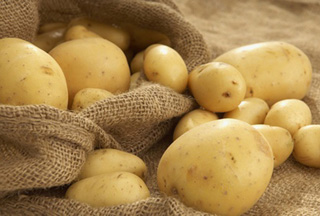Potato export from Armenia to Georgia was not infected

On November 1st Georgia Online published information writing that Georgia would return 470 tones of potato imported from Armenia.
The online media refers to the committee of state revenue of Georgia and writes that inspection of the import products at the border passing section in Sadakhlo found out hazardous microorganisms that had infected the potato. The web site informs that samples were sent to labs and the fact of being infected was proven. Inspection found out that 114.500 kilograms was infected with Ralstonia solanacearum, and the remaining 356.200 – with Schilb Perc sickness. The Georgian government has instructed to return the infected potato to the country that imported (Armenia). The infected potato was imported to Georgia on October 27-31 by 20 cargo trucks.
We were told by the agriculture ministry spokesperson that the mentioned potato shipping was exported to Georgia by an entrepreneur, and they do not want to discover that name. “We do not want to give out the name because it is a disputable issue. It has not been proven yet as the Georgian arty has not confirmed anything in writing, thus we cannot say what region of Armenia exported that potato. We do not think it is good to publish that information because the Georgian party is protecting their domestic production,” said the agriculture ministry spokesperson. The spokesperson of the Armenian food safety department said the exporter received refusal to let the import in verbally. “At the border they were refused to import verbally only. The Georgians looked at the potato and said “it is not good,” and they did not provide any document. Following this incident the head of the food safety department of Armenia left for Georgia to meet his counterpart to resolve the issue. He will try to find out what the problem is in Georgia.”
Armine Sukiasyan, the Armenian food safety department spokesperson, says generally import is subject to inspection, and if any suspicious items come up, they send to labs for inspection. “In this case everything was fine and the export cargo was supported by proper documentation,” she said.
Currently the trucks are at the border, and samples were sent to Armenian labs as well. The future destiny of this export will be clear shortly, when proper documentation is produced by both sides.
Concerning the media publication about hazardous microorganisms in the potato the spokesperson of the food safety department said, “I am saying it one more time that we have not been provided with any documentation. Maybe after their comments they decided to say that some part was infected, and some no. We do not know what the media publication is about and where they took those statements from. The Armenian official department refutes the statement that there has been any official lab inspection conclusion sent to us.”
By Ofelia Hovhannisyan

























